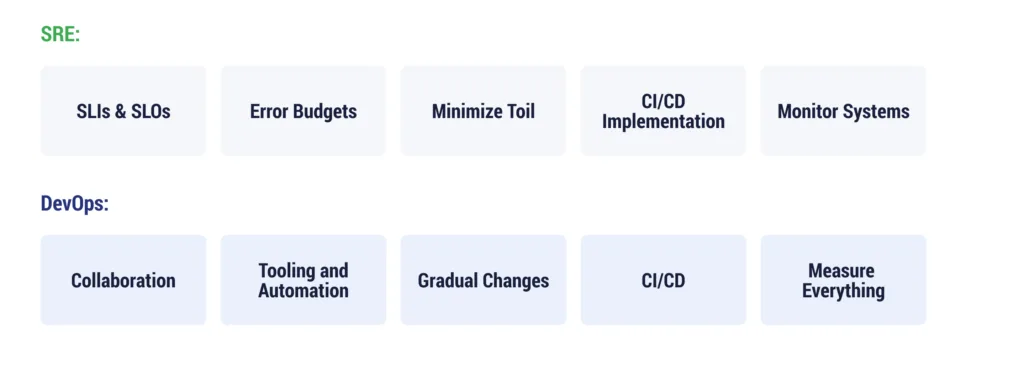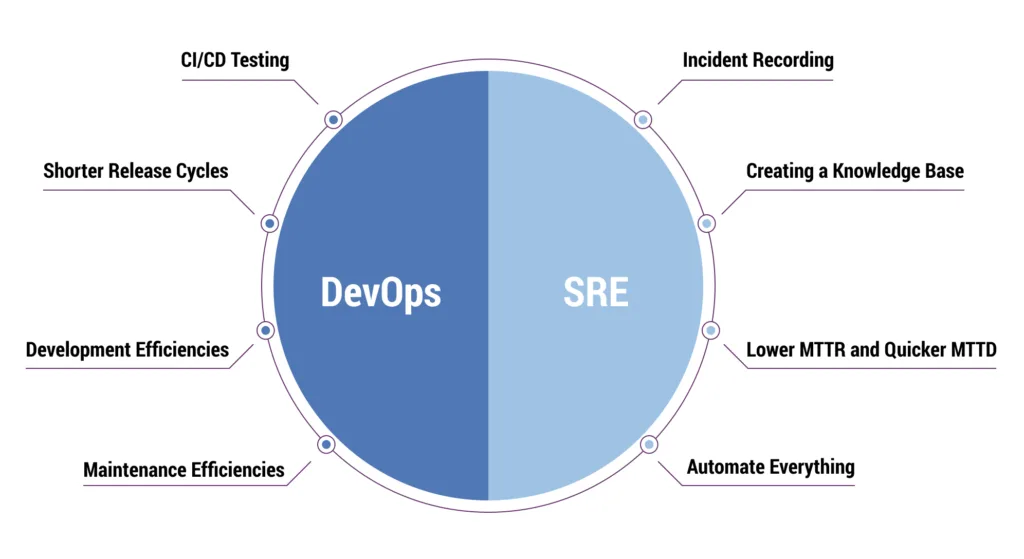
A software system needs a strong foundation and consistent processes to be reliable, scalable, and efficient. DevOps teams and site reliability engineers (SREs) have important roles to play in these processes. Each team brings its own skills and specialties to the table, but knowing the difference between SRE vs. DevOps is a critical step in the decision making process. When you’re working on a software development project, it may be a good idea to implement DevOps, bring in SREs, or do both. In this article we’ll discuss the key differences between SRE vs. DevOps and the features of each to help you make a better informed decision.
What is a Site Reliability Engineer?
A site reliability engineer (SRE) is responsible for ensuring software systems are running as expected when it comes to their performance, reliability, and scalability. Using software engineering principles and automation tools, SREs monitor software environments to improve the reliability of core processes.
What is DevOps?
In a DevOps environment, software development and IT operations teams work together to develop high-quality software at a more efficient rate. The focus in DevOps is on the cultural shift necessary to bring team members from different disciplinary areas together to achieve a united goal.
While DevOps is a closely related concept to SRE, it’s a distinct practice and philosophy. According to AWS, the philosophy goes as followed: “At its simplest, DevOps is about removing the barriers between two traditionally siloed teams, development and operations. In some organizations, there may not even be separate development and operations teams; engineers may do both.
SRE vs. DevOps: What are the Key Differences?
One of the primary differences between SRE teams vs DevOps teams is that SRE teams focus on operational functions, and designing and implementing scalable, reliable systems whereas DevOps teams aim to break down silos that inhibit efficient collaboration between development and operations while creating solutions to meet company goals.
Other differences include:
Principles
SRE and DevOps teams both follow sets of separate, key principles.

SRE Principles:
- Service level indicators
- Service level objectives
- Error budgets
- Minimize toil
- CI/CD implementation
- Monitor systems
DevOps Principles:
- Collaboration
- Tooling
- Automation
- Gradual changes
- CI/CD
- Measure everything
Skills
In DevOps, skills are mostly related to the core of software development. DevOps team members write code, test it, and move it to the production environment to add a new feature or solve a problem. SREs are more skilled in determining what might not be working as intended and figuring out how to solve the issue. If SREs are able to automate tasks to lower the likelihood of errors, they’ll do that as well.
Implementation and Development
Development and implementation on a DevOps team is all about delivering key software to end users in a way that balances speed and quality. Code is developed in an iterative fashion – written and tested in chunks, deployed with versioning, and improved over time. SREs examine the implementation of what the DevOps team is building and try to find further improvements through automation and software engineering principles. An SRE can uncover issues in software and provide feedback to the development group to continue to reduce the risk of further errors.
Team Structure
Common roles on a DevOps team include:
- Quality Assurance Engineer – Identifies and fixes bugs in software
- Software Developer – Writes code for the software systems
- DevOps Engineer – A role that has combined operations and development skills
- Release Manager – Plans and coordinates software releases
- DevOps Evangelist – Educates and trains on DevOps culture across teams or organization-wide
- Operations Engineer – Oversees daily operations of software systems
SRE team members are engineers that have development and operational skills, much like the DevOps team, but their attention is more on inward processes as opposed to outward end products.
Automation
Automation plays an important role in DevOps and SRE. DevOps team members are looking to automate processes related to deployment – how can testing happen automatically, how can code be pushed without manual intervention, what features can be expedited, etc. SRE is going to look at redundancies in the development process – which manual tasks can be changed to be programmatic so the developers can save more time and reduce their risk of errors?
What Problems Do DevOps Teams and SREs Solve?

In today’s rapidly evolving tech landscape, both DevOps teams and SREs play critical roles in ensuring the seamless operation and reliability of software systems by overcoming numerous challenges.
Problems DevOps Teams Solve
Software system deployment, development, and maintenance are central to the problems DevOps team members endeavor to solve.
- Continuous delivery testing: Continuous integration and continuous delivery (CI/CD) is a process where these small portions of code are delivered to the production environment on a more frequent basis, and are also tested more quickly. Testing can be more automated using CI/CD tools.
- Shorter release cycle: Instead of waiting to deploy large portions of code, DevOps teams release smaller chunks of code on shorter release cycles. This allows for more precise testing, quicker identification of errors, and shorter backlogs for developers to address.
- Development and maintenance efficiencies: The software development process can be costly, but DevOps teams can reduce the costs associated with developing and maintaining software by using more streamlined efforts and iterative development strategies.
Problems SREs Solve
The problems solved by SREs directly impact how efficiently DevOps team members can perform their duties. Their automations and investigations reduce mean time to recovery and detection, find and document important incidents, and improve organizational transparency.
- Incident recording: Reliability engineers on an SRE team may be present for unexpected incidents, but they also need to be able to document processes for others to follow if they happen to be on call when an incident occurs.
- Creating a knowledge base: Recording and sharing procedures for incidents is just one example of knowledge-sharing SREs should take on. They should also work on documenting particulars of the software development lifecycle, including development, testing, staging, and production. Documentation also needs to be kept up-to-date with the latest changes in automation tools and best practices, or it becomes obsolete.
- Lower mean time to recovery (MTTR): The mean time to recovery (MTTR) is the average time it takes for software systems to return to normal after a problem has been identified. If a bug or issue in production is found, SRE teams can revert the software to its stable iteration to improve the experience for end users.
- Quicker mean time to detect (MTTD): By debuting a new feature to a smaller group of users, SRE teams can reduce the amount of time it takes to detect an issue and limit the impact issues have on the whole user base.
- Automated everything: Automated tools, coupled with infrastructure as code (IaC), can improve the software rollout process and reduce the risks that come from manual production pushes and subsequent tasks.
SRE vs. DevOps: Common Tools
SREs and DevOps teams have distinctive roles that play into each other, and they also have some tools in common. Both groups may use Microsoft Teams, Slack, or Jira for planning, for example. Terraform is an infrastructure as code (IaC) tool used to deploy infrastructure on an automated basis and can be used for configuration management by either team. Ansible can automate tasks on servers for DevOps or SREs. GitHub and GitLab can share and collaborate on software code, track changes, and manage versions.
How TierPoint Can Help with SRE and DevOps
If you’re looking to build a culture of efficient, top performance software development, or you want to better automate the processes of your team, you may benefit from SREs and DevOps. At TierPoint, we can help with both. Our cloud consultants can assist in defining, planning, and incorporating SRE principals into your strategy while our DevOps specialists have the expertise to help you craft, implement, and optimize your DevOps transformation. Learn more about our cloud DevOps consulting services.
FAQ
SRE and DevOps are not mutually exclusive but rather, they have different but complimentary focuses and objectives. SRE is a specific approach to ensuring the reliability and performance of software systems, while DevOps is a broader cultural and collaborative practice that aims to bring development and operations teams together.
SRE and DevOps teams can coexist and often work well together. While there might be some overlap in their responsibilities and tools used, their primary focuses and objectives are different, making them more complementary than competitive. Organizations can benefit from the coexistence of SRE and DevOps, as it allows them to leverage the strengths of each approach to build a more reliable, efficient, and collaborative software development and operations environment.

